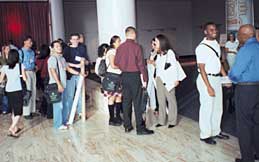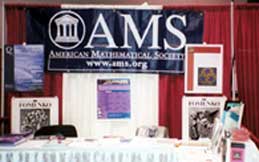
Mathematics at the 2003 SACNAS Conference
The 2003 conference of the Society for Advancement of Chicanos and Native Americans in Science (SACNAS), held in Albuquerque, New Mexico, October 2-4, included a greatly increased presence of mathematics on the program--thanks to a coordinated effort by an active group of mathematicians who are SACNAS members. The conference theme, 30 Years at the Crossroads: Merging Disciplines & Advancing Diversity,featured keynote and conference speakers, awards, student poster presentations, and social events, and drew 2,400 participants. The American Mathematical Societywas among the conference session sponsors and was among the 148 exhibitors--colleges and universities, societies and associations, research centers and government agencies--that provided information about educational programs and career opportunities in the sciences. The AMS exhibit drew K-12 science teachers, undergraduate and graduate students, Research Experiences for Undergraduates leaders and faculty.
 |  |
Mathematics-related highlights of the conference:
* Two day-long concurrent Math Institute Sessions for students -- Coding Theory and Explorations in Mathematical Biology-- were sponsored by the American Institute of Mathematics/Research Conference Center (ARCC), the AMS, and the National Science Foundation. The Coding Theory session was co-chaired by Ivelisse Rubio (University of Puerto Rico-Humacao) and Ricardo Cortez (Tulane University). John Little (College of the Holy Cross) and Edward Mosteig (Loyola Marymount University) also served on the workshop. The Explorations in Mathematical Biology session was also co-chaired by Rubio and Cortez, with Lisa Fauci (Tulane University) and Matthew Hopkins (Sandia National Laboratories) serving on the workshop.
* William Y. Veléz (University Distinguished Professor in the Mathematics Department at the University of Arizona) gave the Founder's Celebration Keynote Address.
* Arlie Petters (recipient of the first Blackwell-Tapia prize in mathematical science, currently Martin Luther King Jr. Visiting Professor at M.I.T.) gave a Keynote Address, Gravitational Lensing: Cosmic Mirages, on Saturday. The lunch and keynote address were sponsored by MSRI, and David Eisenbud (MSRI Director and AMS President) introduced Petters.
 |  |
* There were four Graduate Oral Presentations in Mathematics (presenters listed in bold): SARS Outbreaks in Ontario, Hong Kong and Singapore: The Role of Diagnosis and Isolation as a Control Mechanism, presented by Gerardo Chowell-Puente, Paul W. Fenimore and Melissa A. Castillo-Garsaw (Carlos Castillo-Chavez, advisor), Los Alamos National Laboratory; Effects of Behavioral Changes in Epidemic Attack Models, presented by Sara Y. Del Valle, Herbert Hethcote and Mac Hyman (Carlos Castillo-Chavez, advisor), Los Alamos National Laboratory; When Algebra Met Biology, presented by Brandilyn S. Stigler (Reinhard Laubenbacher, advisor), Virginia Bioinformatics Institute at Virginia Tech; and If This Room Were a Torus, Where Would You Sit, presented by Dustin P. Poster (Peter Haskell, advisor), Virginia Tech.
 |  |
* Undergraduates presented Student Posters on mathematics in the exhibit hall on Friday afternoon and Saturday morning. The prize-winning poster was A Mathematical Model for Photoreceptor Interactions, presented by Daniel J. Hernandez, Jon Van Laarhoven, Ubaldo Rodríguez Bernier and Miguel Angel Cólón Veléz (Carlos Castillo-Chavez, advisor), Los Alamos National Laboratory.
* The Connections in Mathematics symposium was chaired by Ricardo Cortez (Tulane University), with Alejandro Aceves (University of New Mexico), Minerva Cordero-Epperson (University of Texas at Arlington), Jesus De Loera (University of California, Davis) and Cora Sadosky (Howard University) as session speakers.
* The Mathematics Outside Academia symposium was chaired by Ivelisse Rubio (University of Puerto Rico-Humacao), with session speakers Erika Camacho (Los Alamos National Laboratory), Homeland Security; Mark DeBels (Cryptographic Application Branch, National Security Agency), Confidentiality, Authentication, and Integrity, Oh My!; Juan Meza (High Performance Computing Research Dept., Lawrence Berkeley National Laboratory), Optimal Methods for Drug Design and Engineering Problems, and Carlos Sin (Director, Fixed Income Derivatives, UBS Warburg), Stochastic Models of Interest Rates.
* Career and Development Opportunities in Mathematical Sciences, a short course, was chaired by Ivelisse Rubio (University of Puerto Rico-Humacao), with speakers Ricardo Cortez (Tulane University), Barbara Deuink (National Security Agency), Victoria Howle (Sandia National Laboratories), and Raymond Mejia (National Institutes of Health).
* Topics for K-12 Teacher Workshops in mathematics were Rethinking Algebra, Numeration: From Computers to the Mayans, and Fun with Fish Math.
* Jim Maxwell, AMS Director of Meetings & Professional Services, was on hand to answer questions related to REU and graduate programs, career opportunities in mathematics, and resources for mathematics educators and professionals.
The AMS exhibit booth offered the following materials for students, teachers and researchers:
- A Mathematician's Survival Guide: Graduate School and Early Career Development, by Steven G. Krantz (AMS, 2003)
- MASS Selecta: Teaching and Learning Advanced Undergraduate Mathematics, by Svetlana Katok, Alexei Sossinsky, and Serge Tabachnikov (AMS, 2003)
- "What Can I Do With A Math Degree?" poster
- Starting Our Careers: A Collection of Essays and Advice on Professional Development from the Young Mathematicians' Network, edited by Curtis D. Bennett and Annalisa Crannell (AMS, 1999)
- Careers in Mathematics, a video and CD of interviews with mathematicians working in industry, business and government (AMS, SIAM and MAA, funded by the Sloan Foundation, 2001), also posted as a streaming video on MSRI's website
- AMS 16-month 2003-2004 Wall Calendar/Poster, available upon request from paoffice@ams.org
- Mathematical Moments, a series of mini-posters that promote appreciation and understanding of the role mathematics plays in science, nature, technology and human culture (produced by the AMS Public Awareness Office
- Resources for Undergraduates
- Guide to Online Resources for High School Students and Teachers
- AWM Essay Contest: Biographies of Contempoary Women in Mathematics flyer
- What's Happening in the Mathematical Sciences, Vol. 5, by Barry Cipra (AMS, 2002)
The AMS is proud to support the annual SACNAS meeting and its programs that encourage advanced education in the mathematical sciences. AMS members who would like to become involved in or who wish to find out more about SACNAS are invited to visit www.sacnas.org.
See also the report on Mathematics at the 2002 SACNAS Meeting.

